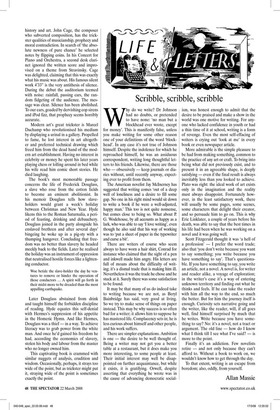Scribble, scribble, scribble
Why do we write? Dr Johnson had no doubts, or pretended to have none: ‘no man but a blockhead ever wrote, except for money’. This is manifestly false, unless you make writing for some other reason one of your definitions of the word ‘blockhead’. In any case it’s not true of Johnson himself. Despite the indolence for which he reproached himself, he was an assiduous correspondent, writing long thoughtful letters to his friends. Likewise, there are those who — obsessively — keep journals or diaries without, until recently anyway, expecting ever to profit from them.
The American novelist Jay McInerney has suggested that writing comes ‘out of a deep well of loneliness and a desire to fill some gap. No one in his right mind would sit down to write a book if he were a well-adjusted, happy man.’ This too is not quite nonsense, but comes close to being so. What about P. G. Wodehouse, by all accounts as happy as a lark, who was able to say ‘I love writing’, even though he also said that his way of working was to ‘put a sheet of paper in the typewriter and curse a bit’.
There are writers of course who seem always to have worn a hair shirt, Conrad for instance who claimed that the sight of a pen and inkwell made him angry. His letters are full of moans about the difficulty of writing; it’s a dismal trade that is making him ill. Nevertheless it was the trade he chose and he stuck at it. Surely there was some satisfaction to be found.
It may be that many of us do indeed take to writing because we are not, as Beryl Bainbridge has said, very good at living. So we try to make sense of things on paper instead. This may be why success is so often bad for a writer; it allows him to suppose he has mastered life. Complacency sets in; he is less curious about himself and other people, and his work suffers.
There are simpler explanations. Ambition is one — the desire to be well thought of. Being a writer may not get you a better table at a restaurant, but it does make you more interesting, to some people at least. Their initial interest may well be disappointed on further acquaintance, but while it exists, it is gratifying. Orwell, despite asserting that everything he wrote was in the cause of advancing democratic social ism, was honest enough to admit that the desire to be praised and make a show in the world was one motive for writing. For anyone who lacked confidence in youth or had a thin time of it at school, writing is a form of revenge. Even the most self-effacing of writers is crying out ‘look at me’ in every book or even newspaper article.
More admirable is the simple pleasure to be had from making something, common to the practice of any art or craft. To bring into being what did not previously exist, and to present it in an agreeable shape, is deeply satisfying — even if the final result is always inevitably less than you looked to achieve. Plato was right: the ideal work of art exists only in the imagination and the reality must always disappoint. Fortunately however, in the least satisfactory work, there will usually be some pages, some scenes, some characters that delight their creator, and so persuade him to go on. This is why Eric Linklater, a couple of years before his death, was able to say that the best times in his life had been when he was working on a novel and it was going well.
Scott Fitzgerald thought it was ‘a hell of a profession’ — I prefer the word trade; also that ‘you don’t write because you want to say something; you write because you have something to say’. That’s questionable. If you have something to say, you write an article, not a novel. A novel is, for writer and reader alike, a voyage of exploration; in the writer’s case it’s a way of entering unknown territory and finding out what he thinks and feels. If he can take the reader with him all the way to the end, so much the better. But for him the journey itself is enough. Curiosity sets narrative going and the writer, like the reader, will, if all goes well, find himself surprised by much that he writes. Write because you have something to say? No: it’s a novel, not a tract or argument. The old line — how do I know what I think till I see what I’ve said? — is more to the point.
Finally it’s an addiction. Few novelists retire — and not only because they can’t afford to. Without a book to work on, we wouldn’t know how to get through the day.
To that extent, writing is an escape from boredom; also, oddly, from yourself.


















































































 Previous page
Previous page